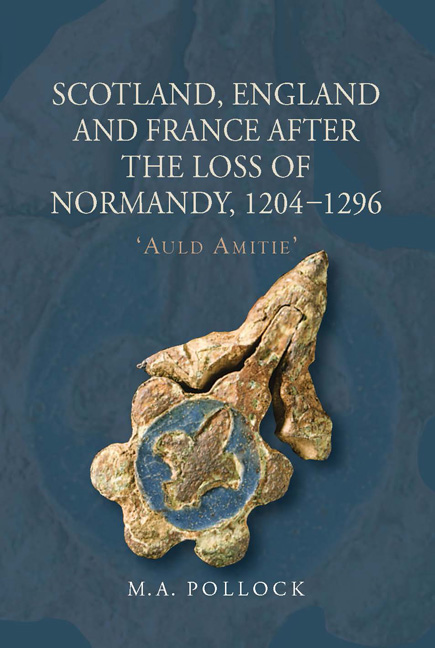Book contents
- Frontmatter
- Dedication
- Contents
- List of Genealogical Tables
- Acknowledgements
- List of Abbreviations
- Introduction
- 1 King John and Scotland after the Loss of Normandy
- 2 The Scots and the First Barons' War
- 3 Alexander and Henry III
- 4 War and Marriage: The French Dimension
- 5 The ‘Auld Alliance’: A New Beginning
- Conclusion
- Bibliography
- Index
4 - War and Marriage: The French Dimension
Published online by Cambridge University Press: 05 May 2015
- Frontmatter
- Dedication
- Contents
- List of Genealogical Tables
- Acknowledgements
- List of Abbreviations
- Introduction
- 1 King John and Scotland after the Loss of Normandy
- 2 The Scots and the First Barons' War
- 3 Alexander and Henry III
- 4 War and Marriage: The French Dimension
- 5 The ‘Auld Alliance’: A New Beginning
- Conclusion
- Bibliography
- Index
Summary
Ermengarde's Legacy
Following the death of Joan Plantagenet, the relationship between the crowns of England and Scotland was strained to breaking point. Henry had failed to fulfil the agreement concerning the 200 librates of land in Northumberland and Cumberland promised in the Treaty of York. Although an inquisition had been set up in 1238 at Carlisle to discuss the lands owed, nothing had been determined. There were some concessions to Alexander but the fact remained that he did not receive the lands promised to him until 1242.
The other issue was that King Alexander remained without an heir at the time of Joan's death. Initially, he tried to enlist Henry's aid in finding a suitable wife and proposed a marriage with one of the sisters of King Henry III's wife, Eleanor of Provence. Henry, however, was reluctant to promote the marriage and sent a message to Alexander in August 1238 stating that the business ‘cannot attain the desired effect wished’. This was a mistake on Henry's part. Alexander was not dissuaded from seeking a French wife but this time he sought a marital union that would bring greater prestige and align the Scottish crown with one of the king of France's most powerful barons – Enguerrand III de Coucy.
King Alexander's marriage to Enguerrand's daughter, Marie, in 1239 complemented Scottish interests. The king of Scots was concerned about English claims of suzerainty in Scotland. King Henry had campaigned to prevent the coronation of the king of Scots in 1221 and in 1233, and Alexander continued to harbour Henry's enemies to weaken Henry's authority within his kingdom. When Alexander decided to marry the daughter of one of the most powerful lords at the French court, Enguerrand de Coucy, Henry became concerned. Such a union brought the crowns of Scotland and France closer together and, as in 1216, reopened negotiations that could spread into England.
- Type
- Chapter
- Information
- Scotland, England and France after the Loss of Normandy, 1204–1296'Auld Amitie', pp. 130 - 161Publisher: Boydell & BrewerPrint publication year: 2015

